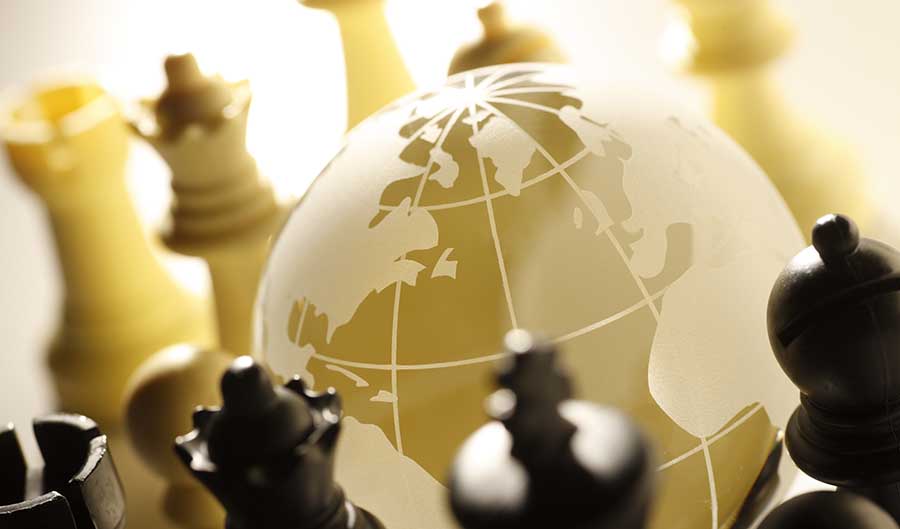
“The world clearly moved away from being bipolar, became temporarily unipolar and is now multipolar,” said former Singaporean foreign minister George Yong-Boon Yeo in a recent interview with German weekly news magazine Der Spiegel. He added that it’s possible to establish order in a multipolar world. He pointed out that the United States is still unwisely resisting multipolarity, saying it should stop clinging to hegemony and learn to play a role in a multipolar world.
Yeo’s remarks contain two meanings: First, hegemony is neither legitimate nor rational, either morally or practically, any longer, and maintaining hegemony is of no value to oneself or to others. Second, the U.S. remains the most powerful country in the world, so it’s important for it to continue playing its role as a major power. Its exit from world affairs is not necessarily a good thing.
People from all walks of life in the U.S. should listen to Yeo’s exhortation. An obsession with hegemony has become a crucial factor leading to fierce confrontation among world powers, pushing the international order to the brink of collapse and giving rise to global turbulence. According to American political scientist Robert Gilpin, a hegemon will pose more danger when it falls, compared with the time of its rise, because it will spare no effort to maintain its position and hence easily act on impulse.
American political elites have in recent years developed a phobia about the decline of U.S. hegemony. Trump’s trade war with China and the continuation of curtailing China in every way by the Biden administration bear a striking resemblance to the events leading up to World War I and World War II. At the Paris Peace Conference, English economist John Keynes predicted that the harsh terms imposed on Germany by the UK and France would ruin Europe. Henry Kissinger, the former U.S. secretary of state, agreed with him.
Today, Americans should realize that the preponderance of power the U.S. has held since the dissolution of the Soviet Union in the early 1990s is long gone. The pattern is similar to that of the New Roman Empire. U.S. domestic politics are mired in multiple crises and internal exhaustion keeps it preoccupied. Changes in the global architecture are significant. After the process of decolonization in the second half of the 20th century, many Third World countries that gained independence have thrived, with increasing power in international politics and economics sufficient to dilute the American hegemony established after WWII.
In fact, the power to break down hegemony comes largely from hegemony itself, because hegemony is consumptive in nature. The fiscal cost of global hegemony is too heavy for any country to maintain. Meanwhile, hegemony itself contains the genes of collapse, as political hegemony in the modern era inevitably mingles with capital hegemony and needs the globalization of capitalism to pave way for it. However, capital will and political will can cooperate with each other, but they can go against each other, too. When the former coerces the latter to make a compromise, hegemony will be put at the risk of collapse.
Since the beginning of the 21st century, Americans have found their interests at odds in the process of its own capital expansion and the development of globalization. The 340 million Americans are no longer a strong community of common interests, which has sabotaged the premise of the U.S. as a political community. Hegemony is becoming a thing of the past by a variety of metrics, including internet technology, which features decentralization, shows the emergence of developing countries in the second half of the 20th century and illustrates the self-destructiveness of hegemony. China will never replace the U.S. to become a new hegemon, not only because it never has had the will but also because modern technology and socioeconomic transformation don't allow any nation state to grow into a hegemon as they did in the past. Whether it’s willing or not, the U.S. must accept the fact that hegemony can’t last, though the process is excruciating.
Perhaps the American elites who are obsessed with hegemony haven’t realized that it is hegemony that is trapping the U.S. in political polarization and a domestic crises. For America today, maintaining normal order and stable existence is more important than clinging to its hegemony. The latter is no more than the icing on the cake, while the former is the foundation of a country. When hegemony impairs stability, giving it up is the wise thing to do.
All countries recoil from hegemony. Nonetheless, if a hegemon always has the resources and capabilities to maintain its position and provide public goods and create order, then it’s of positive influence. The U.S. used to provide many public goods for the international community while maintaining its hegemony, which counted as its contribution to the world. Nowadays, however, it can’t provide as many public goods but still sticks to its hegemony, hence generating a skewed balance of power and responsibility — in addition to creating a quagmire in global governance and exacerbating crises in the international order.
Opposing hegemony does not mean opposing countries of bigger size or better ability to play a greater role, gaining more respect and enjoying more rights and interests. It’s understandable that the U.S., as a major power in the world, seeks more interests and honors than most other countries do. Therefore, the world should pave the way for it to exit from hegemony and transform itself to become a general major country in a decent way.
The U.S. should recognize that hegemony is not sustainable and think about how to construct a multipolar order in which it can participate. When the U.S. exits from hegemony and embraces a multipolar world, a new path to global governance may emerge and the U.S. will probably be able to get its turbulent domestic politics back on track.
